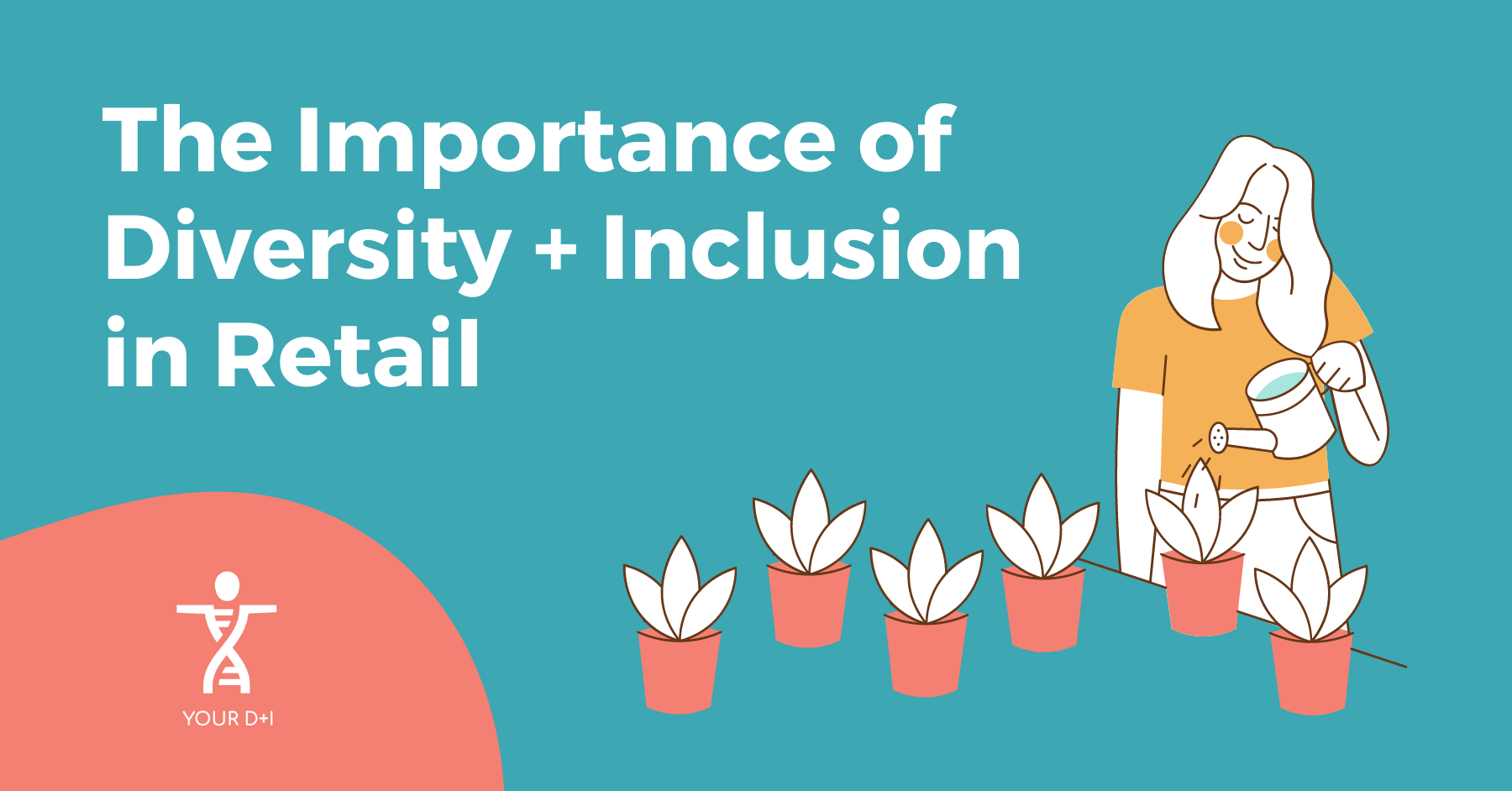The Importance Of Diversity And Inclusion In Retail
In 2021, all businesses should be thinking about Diversity + Inclusion, and that includes those in the retail industry. In fact, there are many reasons why Diversity + Inclusion is particularly important for retail businesses. Retailers offer customers a physical experience – both through their shops and their customer-facing employees. Each of these things mean that customers have many opportunities to have positive or negative experiences of a brand.
Many customers have at least one protected characteristic. This means they will be affected if the shop they are visiting isn’t practising Diversity + Inclusion. And there are many ways it can affect them – from feeling mistreated by staff to not entering the shop.
This blog will explore the different reasons that retail businesses should be taking Diversity + Inclusion seriously. Read on to learn more about the relevance of D+I to your customer’s experiences and how retailers can become more inclusive.
The problem with customer service
Retail is all about making customers happy. In fact, keeping customers smiling is the main duty of many people who work in retail. But do your customer-facing staff know how to make their many customers with protected characteristics feel welcome?
Let’s think about some common things LGBT+ people experience when they are shopping. For example, if a man is shopping with his husband, he may be asked, ‘how are you and your friend today?’ This kind of assumption can make a customer feel misunderstood and unwelcome in the store. Another common experience for LGBT+ people is shop employees using the incorrect pronouns for a customer. This usually happens when an employee wrongly assumes a trans customer’s gender.
Sales assistants are trained to be friendly and ask customers questions. However, if they are not also trained in Diversity + Inclusion, their friendliness can have the opposite affect. For many trans people, being called ‘sir’ instead of ‘miss’ can have a profound effect on their mood. But what can you do to prevent these situations from occurring?
The importance of staff training
Training is key to improving the Diversity + Inclusion of retail businesses. This is because D+I issues for retailers are usually down to exclusionary ideas accidentally being passed down through culture and existing training. These ideas can be anything from how to address customers, like we’ve already mentioned, to the importance of the accessiblility of the physical shop.
For one, educating customer-facing staff on the LGBT+ community can help them understand the importance of using inclusive language. For example, you can teach staff members about the impact of misused pronouns for trans and non-binary customers.
In addition to awareness training, reteaching staff how to interact with customers with a more inclusive approach will be invaluable. Encourage employees to question their assumptions about customers’ gender and relationships and examine whether their language is heteronormative. Champion the use of gender-neutral words, like ‘folks’ instead of ‘girls’, to prevent customers from being misgendered.
In addition to a lack of understanding of LGBT+ customers, retail staff can also exhibit racism. Many people of colour, particularly Black people, have experienced being watched or even followed by sales assistants when trying to shop. This originates in harmful stereotypes around shoplifting and race. It is retailers’ responsibility to provide unconscious bias training to curb this behaviour in their staff.
The importance of accessibility
If you want customers to feel welcome in your store, it is essential to prevent them from feeling mistrusted and misunderstood. Staff training can make a huge difference in this area. Also, having a more diverse in-store team can make customers with protected characteristics feel more welcome. However, some customers may not be able to access the store at all.
The final Diversity + Inclusion issue for retail businesses that we will be discussing in this blog is accessibility. If shops are not accessible for those with disabilities, businesses could be losing out on around 19% of customers. And accessibility is more than wheelchair ramps – though these are an incredibly important aspect of making physical shops accessible. In addition to wheelchair use, there are many other requirements you could consider.
For example, some stores are now implementing a quiet hour once a week, which accommodates for autistic customers. During these times, the store is quieter – both in terms of noise and busyness. This can make the shopping experience less overwhelming for autistic people, who may struggle with the noises and crowds. These quiet hours, however, are currently few and far between.
For this reason and others, many disabled people have instead utilised online retail even pre-pandemic. In addition to those too busy to shop in store, disabled people make up a large number of online shoppers. However, some retailers do not accommodate for disabilities when creating their websites.
Like physical shops, retail websites can overwhelm customers with flashing graphics and sudden music. In addition to this, retail businesses should consider disabilities like visual impairments by having large text options, contrast, and keyboard accessibility. Ensuring that retail websites and shops are accessible will benefit both the business and their customers.
Diversity + Inclusion is key
The demand for Diversity + Inclusion is growing in all sectors as more people understand the need for better treatment of employees with protected characteristic. And the benefits of D+I, which you can read about here, are also becoming better known. However, retail businesses also need to think about D+I when it comes to their customers.
From inclusive customer service to website accessibility, retailers have a responsibility to their customers – and themselves – to consider Diversity + Inclusion. If you’d like to learn more about D+I or have any questions, get in touch with our team now!


